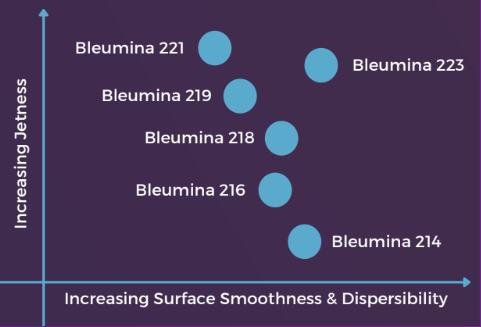Enhanced TDS
Identification & Functionality
- Blend
- No
- CASE Ingredients Functions
- Chemical Family
- Chemical Name
- Country of Origin
- Function
- Pigment
- Pigment Type
- Plastics & Elastomers Functions
- Product Code
- MITM15652
- Single Ingredient
- Yes
- Synonyms
- Acetylene Black, Furnace Black, Lamp Black, Thermal Black
- Technologies
- Product Families
Features & Benefits
- CASE Ingredients Features
- Key Features
These blacks are designed to be highly dispersible, provide excellent color, while maintaining mechanical properties. A balance of jetness, gloss and blue tone is maintained to provide
exquisite color properties and esthetics in the final application.
Applications & Uses
- Coating End Applications
- Compatible Polymers & Resins
- Compatible Substrates & Surfaces
- Plastics & Elastomers End Uses
- Markets
- Applications
- Product Applications
Bleumina® 219 is designed for application in wide range of polymers including engineering plastics such as PC, ABS, SAN, ASA, PA, POM, PBT, PET, PS, PPS, PMMA and standard polymers like PP, PE, PVC, TPO, TPE etc. Key applications areas include automotive interiors & exteriors, consumer electronics, home appliances, coatings, and many other niche applications.
Properties
Regulatory & Compliance
- Quality Standards
Technical Details & Test Data
- Typical Performance Matrix

Packaging & Availability
Principal Information
- Group Principal Number
- S003252
- Principal
Other
- ADR/RID/ADN Proper Shipping Name
- Not Applicable
- ADR/RID/ADN UN Number
- Not Applicable
- Appearance (SDS)
- Black color
- Dust Explosion Class (SDS)
- St1
- Dust Explosion Class (SDS)
- St1
- Dust Explosion Class (SDS)
- St1
- Explosive Nature (SDS)
- Dust may form explosible mixture in air
- IATA/ICAO Proper Shipping Name
- Not Applicable
- IATA/ICAO UN Number
- Not Applicable
- IMO/IMDG Proper Shipping Name
- Not Applicable
- IMO/IMDG UN Number
- Not Applicable
- Insoluble in (SDS)
- Water
- Item Number
- Odor (SDS)
- Odorless
- Other Hazards
- This substance is classified as hazardous as a combustible dust by the United States 2012 OSHA Hazard Communication Standard (29 CFR 1910.1200). May cause reversible mechanical irritation to the eyes, skin and respiratory tract especially at concentrations above the occupational exposure limit. Do not expose to temperatures above 300°C.
- Temperature Control
- No
- USA/DOT UN Number
- Not Applicable
- Optical Properties
Value Units Test Method / Conditions Relative Tinting Strength 150.0 % % - Physical Properties
Value Units Test Method / Conditions Particle Size 16.0 nm nm - SDS Physical and Chemical Properties
Value Units Test Method / Conditions Autoignition Temperature (SDS) min. 140.0 °C °C Bulk Density (SDS) 200.0-680.0 kg/m³ kg/m³ water = 1, Granules Bulk Density (SDS) 100.0-420.0 kg/m³ kg/m³ water = 1, Powder Explosion Limit (SDS) 50.0 g/m³ g/m³ Dust Explosive Pressure Rise Rate (SDS) 30.0-100.0 bar/s bar/s Initial Boiling Point (SDS) min. 4000.0 °C °C Lower Explosion Limit (SDS) 50.0 g/m³ g/m³ VDI 2263 dust Maximum Explosion Pressure (SDS) 10.0 bar bar Minimum Ignition Energy (SDS) min. 10000.0 MJ MJ Minimum Ignition Energy (SDS) min. 10000.0 MJ MJ VDI 2263 Minimum Ignition Temperature (SDS) min. 500.0 °C °C BAM Furnace cloud Minimum Ignition Temperature (SDS) min. 500.0 °C °C VDI 2263 cloud Minimum Ignition Temperature (SDS) 400.0 °C °C VDI 2263 layer Molecular Weight (SDS) 12.01 g/mol g/mol Relative Density (SDS) 1.7-1.9 - at 20°C, Water = 1 Volatile Content (SDS) max. 2.5 %(V) %(V) non-oxidised carbon black Volatile Content (SDS) 2.0-8.0 %(V) %(V) oxidised carbon black pH (SDS) 2.0-10.0 - at 20°C, 50 g/l H₂O - Shelf Life & Stability
Value Units Test Method / Conditions Shelf Life 730.0 d d
